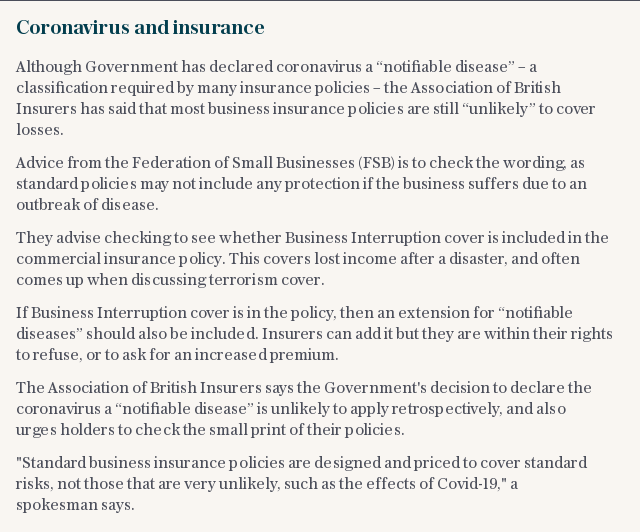Watchdog prepares legal action against insurers over Covid payouts

Eight insurers face a courtroom showdown with the City watchdog after refusing payouts to crisis-hit small businesses.
Judges will be asked to rule on whether business interruption insurance policies sold by the likes of Hiscox, RSA and Zurich cover losses caused by Covid-19 and the nationwide lockdown.
Businesses have been locked in battle with insurers over the meaning of ambiguous wordings in policy documents, with billions of pounds and thousands of livelihoods at stake.
Insurers argue they never intended to cover losses from a global pandemic and that doing so would be financially ruinous, sending them to the brink of bankruptcy. As a result, legions of companies which thought they had insurance have been left with no support and no income either.
Some insurers have already thrown in the towel and decided to pay out on claims as the threat of legal action looms.
The Financial Conduct Authority (FCA), which is pursuing the court case, said: “A number of the relevant insurers decided to accept claims from policyholders with certain policies which included particular wordings which had previously been in dispute.”

The industry already expects to pay out £900m in business interruption claims, according to the Association of British Insurers, meaning losses could run to billions depending on the outcome of the test case being brought by the FCA.
The FCA's action was welcomed by business groups whose members are facing a cash crunch due to the slump in economic activity and forced closure of swathes of the economy.
Kate Nicholls, chief executive of industry group UKHospitality, said: “It is time that insurers played fair and stopped hiding behind technicalities.
“We are delighted to see that the FCA has taken on board the legitimate claims of hospitality companies in its challenge to insurers.
"These businesses have been hit hard by the coronavirus and had expected their insurance policies to cover them for forced closures.”
Mike Cherry, of the Federation of Small Businesses, said the case could give legal clarity to small firms that had bought cover in good faith and feel unfairly treated.
Arch, Argenta, Ecclesiastical, MS Amlin and QBE are the other insurers expected to participate directly in the court case.
While only eight insurers will be represented in court, the FCA said it will ask judges to consider 17 policy wordings sold by 16 insurers, also including Allianz, AIG, Aviva and Axa.
The sample policies were selected following a review of more than 500 contracts submitted by 40 insurers, the FCA said.
The regulator told other insurers to check their policy wordings against those being sent to court to assess if they will be affected by the rulings.
The FCA intends to file its claim in court by June 9 ahead of a court hearing in the second half of July, which could last two weeks.
The watchdog warned businesses that just because their insurer or policy wording has been included in the legal action does not mean they will necessarily be entitled to a payout.
Regulators repeated their view that the pandemic has not triggered valid claims under most business interruption policies. These are typically designed to provide cover for lost trade if a firm is forced to close by problems such as flooding, and are not intended to insure against a shutdown triggered by state decree.
The test case is intended to resolve uncertainty over the smaller number of cases where the wording is unclear.

Policies were chosen for inclusion in the test case based on whether they represent “key arguable issues” between policyholders and insurers rather than on the market share of the insurers that sold them.
Some businesses are concerned that the FCA case will not bring the certainty they require, with many taking separate legal action of their own.
Mick Armstrong, chair of the British Dental Association (BDA), said that the FCA’s “one size fits all” approach failed to take into account the unique challenges faced by some industries.
Ravi Nayer, a lawyer at Brown Rudnick which is representing the BDA, said the FCA’s announcement gives no comfort over whether challenges facing the healthcare sector will be taken into account by the court. Dentists were forced to stop offering many routine treatments but were not included in a break from business rate payments offered to most firms on the high street.
Mr Nayer said: “The context is necessary to achieve a fair outcome."
Insurers including Hiscox, RSA and Zurich welcomed the FCA’s court action as a way of quickly providing clarity.
Separately, former Home Secretary Amber Rudd has been appointed to chair one of six working groups that will work with an insurance industry-wide steering group aimed at preparing insurers better for future pandemics.
Ms Rudd, who resigned from Theresa May’s government over an immigration controversy, will lead the working group on legal, regulatory and government affairs.

